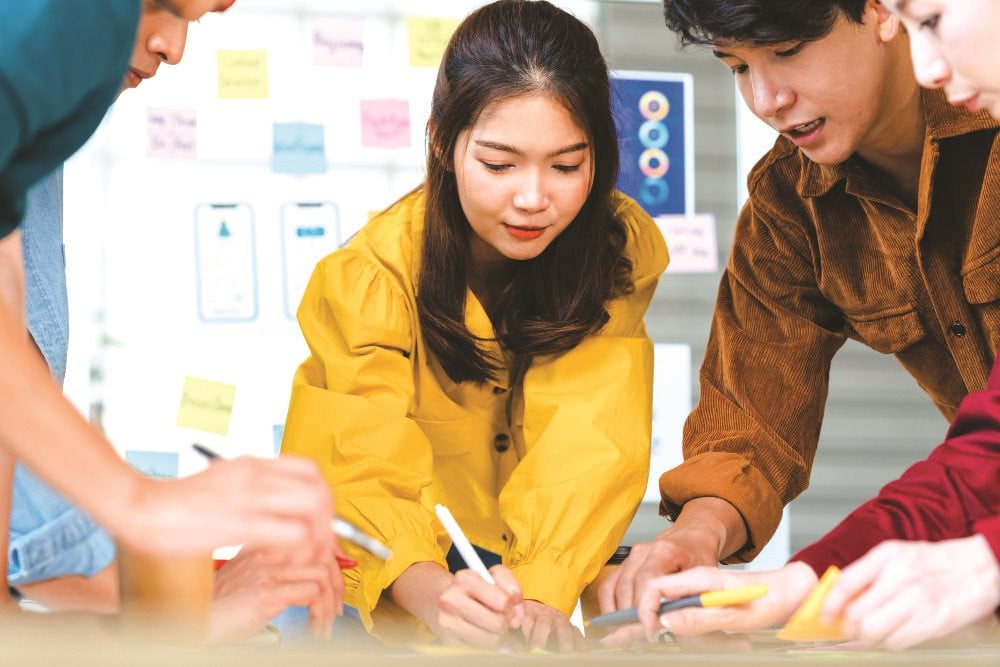To get to a career, a job, almost everyone has to take the first steps.
Let's look at a baby. From just sitting, he stands up, takes his first few steps. Then he walks with firmer steps. These are healthy growing babies. For babies with motor disabilities, it takes many difficult steps in physical therapy, from sitting, he can stand up straight, take his first steps, and from there, he can walk like everyone else. From those first firm steps, the babies have many activities later.

In all activities of life, people need to have initial steps. To learn the language of their ancestors, children need to listen to the pronunciations of their mothers, fathers, and relatives around them. Listen and repeat, more and more, so that from here, they can communicate with their mothers, fathers, grandparents, and relatives around them.
Then comes writing. When children go to school, they learn the writing that their parents learned, the writing that their community used, and now the next generation. There are the first, bewildering lessons. Then come the later lessons. The language used by their ancestors, through years of study, is enriched, increasingly more and richer, expressing ideas that are increasingly diverse and profound, including many beautiful words and scientific words. Then comes the foreign language that learners are exposed to. From simple words, to expanded words, and then gradually improving listening, speaking, reading and writing skills.
Everyone has their first steps when learning a profession. There are many different professions, so the first steps to learning a profession are also very different. Nursing students, in addition to theory, need to learn many practical operations. Giving injections and giving fluids to patients are daily tasks. There will be students who are confused in the first few sessions of finding the patient's vein, and it takes them two or three times to get it right. Then, later on, the operations will be neater, quicker, and more accurate.
Those who study to become teachers need even more practice sessions and internships in the classroom. Observe teachers who have taught for many years. Learn from sample lesson plans. Practice preparing lessons, focusing on the basics. Those student teachers have practice sessions in the classroom, teaching in front of students with the observation of friends and teachers below. Then give comments and draw experience on the teaching content. The student teachers absorb and adjust for the next lessons. From those initial awkward sessions, the student teachers graduate and continue to learn, and over time many have become good teachers, respected by many generations of students.
A person learning tailoring also needs to take the first steps, gradually getting used to the needle and thread. One must pay attention to the actions of the teachers who have gone before. See and understand what the teachers instruct, and at the same time, diligently practice, little by little, right from the beginning. Observe carefully, practice diligently, pay attention, step by step, to gradually master it, and from there, one's skills will gradually improve.
The same goes for music learners. They must start with basic theoretical knowledge, gradually accumulate it, and practice a lot on their favorite instruments. Only then can music lovers achieve greatness in their performances with the instruments they are attached to and passionate about.
A person's start-up also needs a beginning. Find out what is related to the job you want to do. How to do it. Invest in equipment and supplies needed for the job you will do. Initially find out the market and output for the products you make. Then put all your efforts into it. Both in agriculture and in services and trading, from a moderate scale, gradually expand when you see favorable conditions and progress, continue to invest more.
Obviously, every profession needs a beginning. Learning, understanding, practicing, mastering, gradually becoming a skill. Mark Twain was right when he wrote: “The secret of success is getting started.”
Reality shows us: Some people have a smooth start; others have a difficult and arduous start, and then success. After the beginning, how they develop depends on the person doing it in real life. Some people develop quickly and effectively when they direct their activities in the right direction, in line with their passion. A person's development, in some cases, also depends on luck: meeting dedicated instructors, meeting a suitable working environment, meeting like-minded people working in the same profession. Sometimes, a person's start-up is not favorable right away. Some people fail and have difficulty the first time they practice and work. Some people change to a new, different direction. And the next time, success smiles on them.
Life is always moving forward. And to reap future successes, one must not only take the first step. Albert Einstein once shared: “Life is like riding a bicycle. To keep your balance, you must keep moving.”
Indeed, to have further successes, one must continue to work, continuously focus on one's activities and career.
To start, the subject of the activity needs motivation to work. Motivation comes from oneself, sometimes from encouragement from relatives. And to have further successes, people need to have habits in daily professional practice. Is it true that today's success comes from the memorable start of yesterday?
Source


![[Photo] Panorama of the cable-stayed bridge, the final bottleneck of the Ben Luc-Long Thanh expressway](https://vphoto.vietnam.vn/thumb/1200x675/vietnam/resource/IMAGE/2025/9/30/391fdf21025541d6b2f092e49a17243f)
![[Photo] The 1st Congress of Phu Tho Provincial Party Committee, term 2025-2030](https://vphoto.vietnam.vn/thumb/1200x675/vietnam/resource/IMAGE/2025/9/30/1507da06216649bba8a1ce6251816820)
![[Photo] Solemn opening of the 12th Military Party Congress for the 2025-2030 term](https://vphoto.vietnam.vn/thumb/1200x675/vietnam/resource/IMAGE/2025/9/30/2cd383b3130d41a1a4b5ace0d5eb989d)
![[Photo] General Secretary To Lam, Secretary of the Central Military Commission attends the 12th Party Congress of the Army](https://vphoto.vietnam.vn/thumb/1200x675/vietnam/resource/IMAGE/2025/9/30/9b63aaa37ddb472ead84e3870a8ae825)

![[Photo] President Luong Cuong receives President of the Cuban National Assembly Esteban Lazo Hernandez](https://vphoto.vietnam.vn/thumb/1200x675/vietnam/resource/IMAGE/2025/9/30/4d38932911c24f6ea1936252bd5427fa)































































































Comment (0)